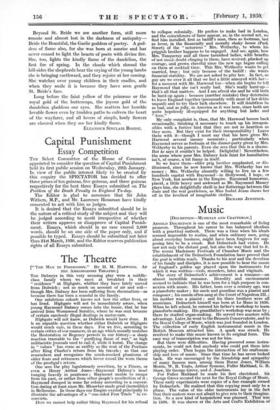The Theatre
[" THE MAN IN POSSESSION." BY H. M. HARWOOD. AT THE AMBASSADORS THEATRE.]
Tee Dabneys in this very amusing play were a middle- class family whom we meet at breakfast in their " residence ' at Highgate, whither they have lately moved from Dulwich ; not so much on account of air and soil— though Mrs. Dabney has been suffering from rheumatism—as because there has been a scandal in the family.
One salubrious suburb knows not how the other lives, or has lived. Highgate will not be immediately aware, when young Raymond Dabney comes into the house, that he has arrived from Wormwood Scrubbs, where he was sent because of certain carelessly illegal dealings in motor-cars.
Highgate will not knoW, as Dulwich would have done. It is an arguable question whether either Dulwich or Highgate would much care, in these days. For we live, according to certain critics of our manners, in an age which morally matches the Restoration or Regency periods in our history--a sharp reaction traceable to the purifying flame of war," as high militaristic journals used to call it, while it burnt. The change in " values " has come as swiftly as the rout of the Puritans after King Charles's return from his travels • so that one remembers and recognizes -the much-mocked phantoms of older fears and reticences which hover round the worn theme of the prodigal's return. One sees the play lugubriously rewritten, by a Pinero, or even a Henry Arthur Jones--Raymond Dabney's head hanging heavily in penitence ; Raymond unable to escape from his past, or rather from other people's recollection of it ; Raymond dumped in some far colony -according to a conven- tion dating at least since Mr. Micawber made good (incredibly) in Melbourne. In those days our Empire existed principally to illustrate the advantages of it " one-sided Free Trade in ex- convicts.
Here we cannot help rather liking Raymond for his refusal
to collapse colonially. He prefers to make bad in London, and the coincidences of farce appear, as, in the second act, we find him installed, first as bailiff'S man, then as footman, last as lover, in the financially and morally shaky house (Park Street) of the " notorious " Mrs. Wetherby, to whom his priggish brother happens to be engaged. And see, again, how Mrs. Tanqueray and all those tarnished ladies, with benefits of not much doubt clinging to them, have revived, plucked up courage, and grown cheerful since the new age began calling on them at cocktail time. This Mrs. Wetherby wants to get married, true ; but only because of the bailiff : she wants financial stability. We are not asked to pity her In fact, so gay are we over it all that we feel a little annoyed with her— for a moment with Mr. Harwood too—when she begins to tell Raymond that she isn't really bad. She's 'really hard-up-L. that's all that matters. And I am afraid she and he will both be hard-up again ; - because (another mistake) they determine to leave England together (presumably with most Of her debts unpaid) and to-try their luck elsewhere. It will d6ubtless be as bad, and as jolly, in America as it was here, since both are quite hopelessly ill-equipped for anything but larks and
love." •
My only complaint is, then, that Mr. Harwood hovers back occasionally, thinking it necessary to touch up his irrespon- sibles with a furtive hint that they are not so heartless as they seem. But they exist for their irresponsibility ! Leave them with it—though I must say that his hero gives Mr. Harwood several uneasy moments ; particularly when Raymond serves as footman at the dinner-party given by Mrs. Wetherby to his parents. Even she sees that this is a shame. But he says it couldn't be helped. Delightful ! Nevertheless, the scene where poor Mrs. Dabney feels faint for humiliation isn't, of course, a bit funny in itself.
So we leave them—elder prig brother supplanted, or dis- illusioned, since he now knows that Mrs. Wetherby has no money • Mrs. Wetherby absurdly willing to live on a few hundreds capital with Raymond—in Hollywood, I hope, or New York, but nowhere in the Empire. Raymond humorous, placid, a little heavy and awkward as Mr. Raymond Massey plays him, she delightfully shrill in her flutterings between the duns and the real gentlemen, as Miss Isabel Jeans shows her off in the loveliest of imaginable clothes.
RICHARD JENNINGS.






































 Previous page
Previous page